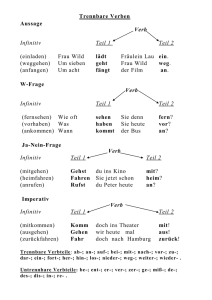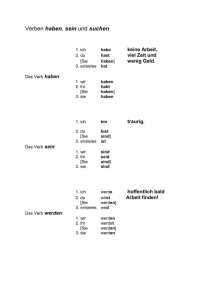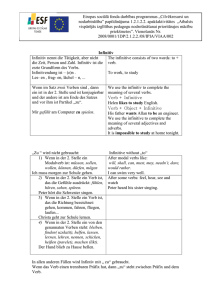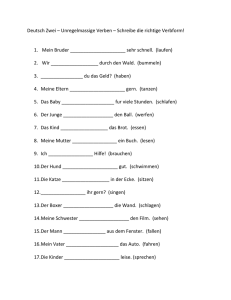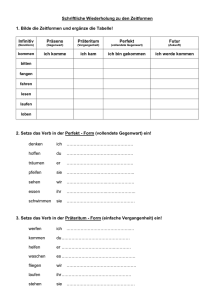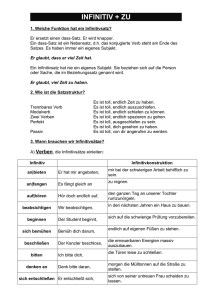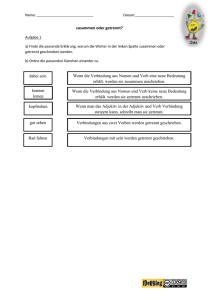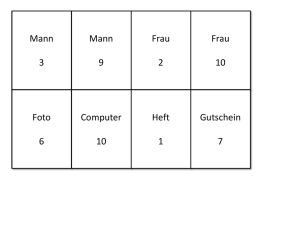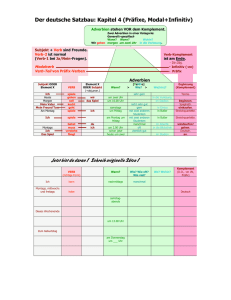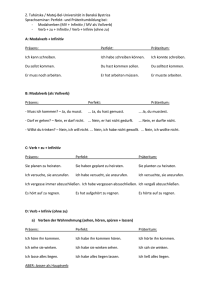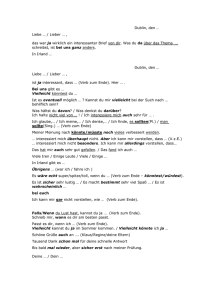Document
Werbung
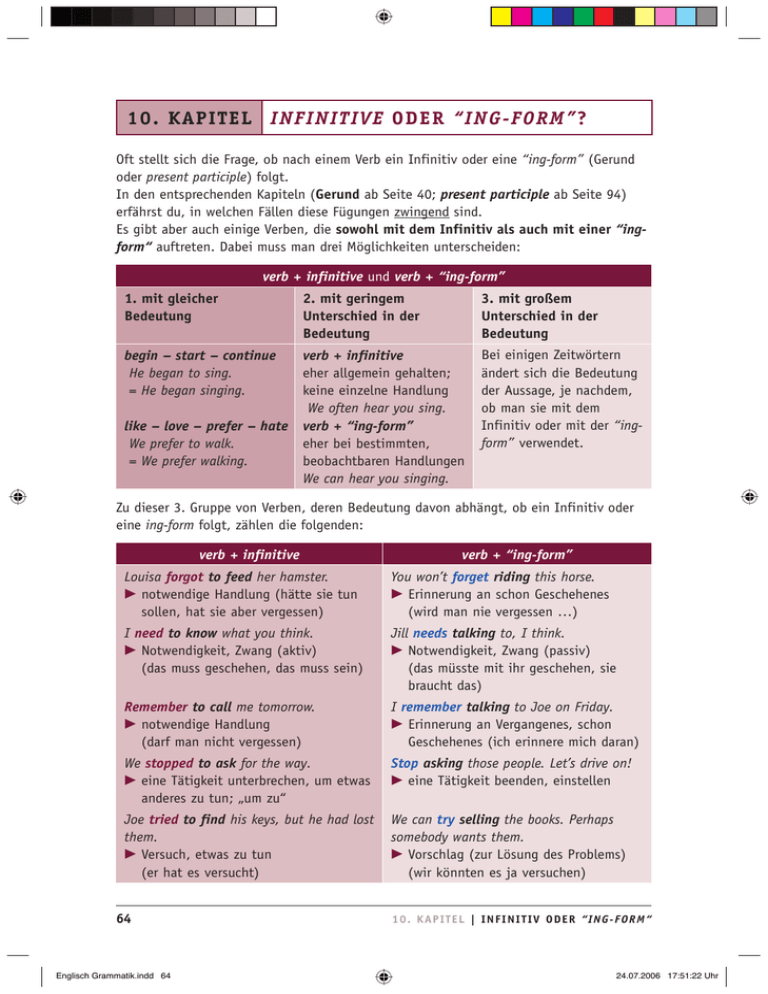
10. KAP ITEL IN F IN IT IV E OD E R “IN G-FORM ”? Oft stellt sich die Frage, ob nach einem Verb ein Infinitiv oder eine “ing-form” (Gerund oder present participle) folgt. In den entsprechenden Kapiteln (Gerund ab Seite 40; present participle ab Seite 94) erfährst du, in welchen Fällen diese Fügungen zwingend sind. Es gibt aber auch einige Verben, die sowohl mit dem Infinitiv als auch mit einer “ingform“ auftreten. Dabei muss man drei Möglichkeiten unterscheiden: verb + infinitive und verb + “ing-form” 1. mit gleicher Bedeutung 2. mit geringem Unterschied in der Bedeutung 3. mit großem Unterschied in der Bedeutung begin – start – continue He began to sing. = He began singing. verb + infinitive eher allgemein gehalten; keine einzelne Handlung We often hear you sing. verb + “ing-form” eher bei bestimmten, beobachtbaren Handlungen We can hear you singing. Bei einigen Zeitwörtern ändert sich die Bedeutung der Aussage, je nachdem, ob man sie mit dem Infinitiv oder mit der “ingform” verwendet. like – love – prefer – hate We prefer to walk. = We prefer walking. Zu dieser 3. Gruppe von Verben, deren Bedeutung davon abhängt, ob ein Infinitiv oder eine ing-form folgt, zählen die folgenden: verb + infinitive verb + “ing-form” Louisa forgot to feed her hamster. notwendige Handlung (hätte sie tun sollen, hat sie aber vergessen) You won’t forget riding this horse. Erinnerung an schon Geschehenes (wird man nie vergessen …) I need to know what you think. Notwendigkeit, Zwang (aktiv) (das muss geschehen, das muss sein) Jill needs talking to, I think. Notwendigkeit, Zwang (passiv) (das müsste mit ihr geschehen, sie braucht das) Remember to call me tomorrow. notwendige Handlung (darf man nicht vergessen) I remember talking to Joe on Friday. Erinnerung an Vergangenes, schon Geschehenes (ich erinnere mich daran) We stopped to ask for the way. eine Tätigkeit unterbrechen, um etwas anderes zu tun; „um zu“ Stop asking those people. Let’s drive on! eine Tätigkeit beenden, einstellen Joe tried to find his keys, but he had lost them. Versuch, etwas zu tun (er hat es versucht) We can try selling the books. Perhaps somebody wants them. Vorschlag (zur Lösung des Problems) (wir könnten es ja versuchen) 64 Englisch Grammatik.indd 64 1 0 . K A P I TE L | I NF I NI TI V ODE R “ I N G - F O R M“ 24.07.2006 17:51:22 Uhr 74 Infinitiv (mit oder ohne “to”) oder “ing-form”? Finde die richtige Verbform. Streiche die falsche Verbform durch, so dass sich ein richtiger Satz ergibt. We tried to phone/tried phoning them the other day, but nobody answered. I think I remember to see/remember seeing these people at Joe’s party. 3. While he was working in the garden, Dad stopped to smoke/stopped smoking a cigarette. 4. Brian, you need to be/need being more careful when you ride your bike. 5. How awful! You forgot to call/forgot calling Grandma on her birthday? She will never forgive you. 6. Remember to send/Remember sending Max an email. He’s waiting for it. 7. Try to ask/Try asking Richard for help. I’m sure he will do it. 8. Dad doesn’t like Oliver. He says I must stop to see/stop seeing him. 9. Charles forgot to tell/forgot telling us the joke, so he told it again. 10. Look at you car, Mum! It needs to wash/needs washing badly. 1. 2. 75 Setze die richtige Verbform ein: Infinitiv oder “ing-form”. My parents have always told me (say) … thank you when somebody gives me something, and I never forget (do) … it. 2. Lukas is so cute! The girls can’t help (talk) … about him all the time. 3. I don’t want you (use) … my pen again without (ask) … me first, okay? 4. My German teacher made me (feel) … very proud by (read) … my essay in class in front of everybody, but since that day, George refuses (speak) … with me. I think he is jealous. 5. Go on (write) …, Sally, and don’t forget (read) … your essay again before (hand) … it in. 6. Grandpa forgot (feed) … the dog, so he was surprised (see) … that the dog didn’t want to eat. 7. Please stop (talk) …, Mike! I‘m trying (concentrate) … on my work. 8. Harry came (run) … downstairs, (shout) … wildly. He had just seen himself on TV for the first time. 9. Your shoes need (clean) …, Dad. I can (do) … it for you if you let me (use) … your laptop this afternoon. 10. After (listen) … to Gloria for a while, I began (understand) … why everybody thinks she is crazy. 11. If we continue (walk) … in this direction, we will never get there. Let’s (stop) … (ask) … somebody for the way. 12. The guests are coming! I hear them (talk) … and (laugh) … in the street. 13. Dad, have you finished (take) … pictures? We’d like (continue) … the tour. 14. One of my favourite sports is (jog) …, but I can’t stand (do) … it alone. 15. Ron looked so funny in that suit! We couldn’t help (laugh) … when we saw him. That made him angry, of course, so we apologised for (be) … so silly. 16. At first, I enjoyed (take) … the dog for a walk, but now I hate (go) … out in all kinds of weather. Sometimes I’d rather (stay) … indoors (watch) … TV. 17. We’d better (wait) … for Mike. It’s too late now (leave) … without him. 1. Additional exercise Seite 161 I NFI NI TI V O D ER “I NG- FOR M “ | 10. KA P IT EL Englisch Grammatik.indd 65 65 24.07.2006 17:51:23 Uhr
